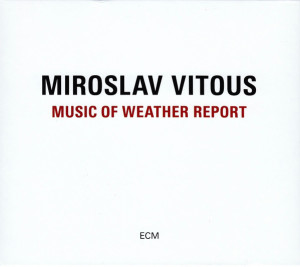 So this is kind of a big deal in the jazz world. Bassist Miroslav Vitous is once again revisiting the ensemble for which he is probably best known, the 1970s progressive jazz-rock fusion group Weather Report, which he co-founded with Austrian-born keyboardist Joe Zawinul and African-American saxophonist Wayne Shorter. A few years ago he touched on that band’s spirit with an ECM album Remembering Weather Report but this time he directly addresses its music.
So this is kind of a big deal in the jazz world. Bassist Miroslav Vitous is once again revisiting the ensemble for which he is probably best known, the 1970s progressive jazz-rock fusion group Weather Report, which he co-founded with Austrian-born keyboardist Joe Zawinul and African-American saxophonist Wayne Shorter. A few years ago he touched on that band’s spirit with an ECM album Remembering Weather Report but this time he directly addresses its music.
The Czech-born bassist (who has now returned to the Czech Republic after having left Czechoslovakia in the Soviet era) is joined on this outing by two sax players, Gary Campbell and Roberto Bonisolo; two drummers, Gerald Cleaver and Nasheet Waits; and Aydin Esen on keys.
I was only marginally aware of Weather Report at the time, mostly through its one hit single, Zawinul’s tune “Birdland” from the 1977 album Heavy Weather. But they were of a piece with Bitches Brew-era Miles Davis, the Mahavishnu Orchestra, Return to Forever and such bands. By the late ’70s they had a groove-heavy sound that’s epitomized by “Birdland,” which today can sound pretty dated. Take a listen to it on whatever online platform you use to see what I mean.
Music of Weather Report takes a handful of songs, including that one hit, and gives them a facelift, updating them to a more modern sound and way of addressing contemporary jazz music. And recorded them (at Vitous’s studio near Turin, Italy) with ECM’s separated, spacious and shiny production style. This approach is particularly apparent on “Birdland,” which has been reordered and rearranged as “Birdland Variations” in ways that only more sophisticated jazz writers than I could explain, but the result is amazing. The lengthy introductory section finds Vitous’s arco bass with effects pedals teasing and hinting at a melody and the saxophones playing alongide, sometimes in unison and sometimes in commentary. Even when they do finally pick up the melody, it’s been sliced and diced to the point that it’s still recognizable but only just. It’s sometimes hard to tell whether a particular sound comes from Vitous’s bass or Esen’s synth. And the drummers further complicate things by playing in different time signatures, one in 3/4 and the other in 4/4 or free time. To their credit even at 10 minutes long, the players never let it settle into a groove or a jam, but in the end, it opens up (at least partly) into longer phrases of that sunny melody that made it a hit the first time around.
The ensemble takes similar approaches with some other Weather Report pieces. Shorter’s “Pinocchio” (which first appeared on Miles’s Nefertiti) is seriously deconstructed (I know, they don’t say that in jazz, they say reharmonized) by Esen and features playful give-and-take between Esen and Vitous, and between the two horn players; Vitous’s driving “Seventh Arrow” is updated with lots of verve shown by the two drummers and two saxes; and his impressionistic “Morning Lake,” which ends the album, is truly beautiful, with synth strings and melodic snatches from the horns.
Interspersed are some blues explorations called “Multi Dimension Blues” of varying length, which give Vitous especially some opportunity to swing and sway a bit on blues-oriented themes.
Rather than trafficking in nostalgia, Miroslav Vitous and this group pay homage to Weather Report by displaying the same forward-looking spirit the original band stood for some 40 years ago. It still sounds like the future.
(ECM, 2016)
